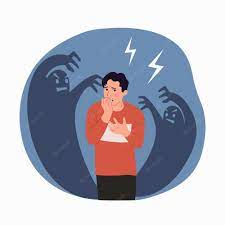Trauma in childhood
Introduction
Children are strong, but they are not indestructible. Adults often claim that traumatized children won't recall it as adults since they were too young to experience it. Childhood trauma, however, may have enduring effects. That is not to say that a child who experiences a traumatic event won't be emotionally scarred for the rest of their life. But it's important to recognize when a child might need outside help to deal with their trauma. Trauma's consequences are lessened by early, passionate care and sympathetic assistance.
What Does Childhood Trauma Mean?
A childhood traumatic experience is any situation that makes kids afraid, including a dangerous or life-threatening situation or recurrent violence at home. Trauma can arise from a variety of unique situations, which is often frequently referred to as adverse childhood experiences (ACEs). For example, abuse that is physical, sexual, or emotional can cause trauma in children. One-time events such as a car accident, a natural disaster (such as a storm), the death of a loved one, or a significant medical event can have a psychological impact on children. Continuous stress, such as living in a dangerous area or being the target of bullying, can be devastating for a child, even if it looks normal to an adult.
Even unrelated events may have a lasting impact on a child's development. For example, watching a loved one go through a catastrophic health crisis can cause great trauma to children. Violent media can also have this impact. Just because something upsets you don’t mean it's traumatic. For example, a child's experience of a parent's divorce is likely to be affected, but it need not be terrible.
A child's brain development can be impacted by traumatic experiences, and this can have long-term implications for the child's physical, mental, and social development.
Even unrelated events may have a lasting impact on a child's development. For example, watching a loved one go through a catastrophic health crisis can cause great trauma to children. Violent media can also have this impact. Just because something upsets you don’t mean it's traumatic. For example, a child's experience of a parent's divorce is likely to be affected, but it need not be terrible.
A child's brain development can be impacted by traumatic experiences, and this can have long-term implications for the child's physical, mental, and social development.
A 2019 review of 134 different research-based publications found that early life exposure to adverse experiences increases the risk of developing a variety of conditions as an adult, such as autoimmune illnesses, lung diseases, cardiovascular diseases, cancer, and increased pain thresholds.
Childhood Trauma's Effects on Mental Health
Childhood trauma may have an impact on one's mental state. The following are a few psychological effects of traumatic events:
Anger Problems
Depression
Feelings of anxiety
elevated levels of stress
Stress condition associated with trauma (PTSD)
Psychotic disorders
Children who have experienced complex trauma may even detach. Dissociation means separating oneself from the event on a psychological level. They may experience memory gaps or forget what happened, believing they are viewing it from a different location because they are not in their body.
Research indicates that adults who experienced trauma as children, such as domestic violence or physical or sexual abuse, attempt suicide at a significantly higher rate.
Trauma's Effects on Relationships
A child's connection with its caregivers—whether they be parents, grandparents, or other relatives or non-relatives—determines both their mental and physical health. The bond between kids and their caretakers can help them learn how to manage their emotions, trust others, and behave appropriately in their surroundings.
A child may, however, come to believe that people are dangerous and that the world is a scary place if they experience trauma that teaches them they cannot trust or rely on that caregiver. Because of this lesson, it becomes very difficult for them to build connections throughout their teens and into adulthood.
Adults who have experienced childhood trauma are more likely to struggle in romantic relationships.
Childhood traumas effects on other facets of life
Sometimes the impacts of childhood trauma extend beyond relationships and mental or physical health. Unfavorable childhood experiences, for example, have been linked in several studies to an increased risk of becoming a criminal offender by the age of 35, often including serious and severe offenses.
Other consequences can be:
having a stronger reaction and being more easily "set off"
Engaging in hazardous pursuits (like speeding while driving or having sex without consent)
being unable of foreseeing or being ready for the future
Increased probability of self-harm
Problems with impulse control
a diminished feeling of self
Having trouble applying logic or solving problems
Traumatized youngsters can also be less equipped to raise their own children in the future.
After a traumatic event, children can recover to a healthy state of functioning, albeit some may experience some degree of pain, and some are less impacted by their environment than others.
It is never too late to visit a psychologist if adverse effects from childhood trauma have been experienced. Whether you adopted an adolescent who was abused more than ten years ago or you never sought therapy for the horrific events you experienced forty years ago, trauma treatment can still be beneficial and successful. Seek online counseling with the top child psychologist at TalktoAngel.


No comments yet